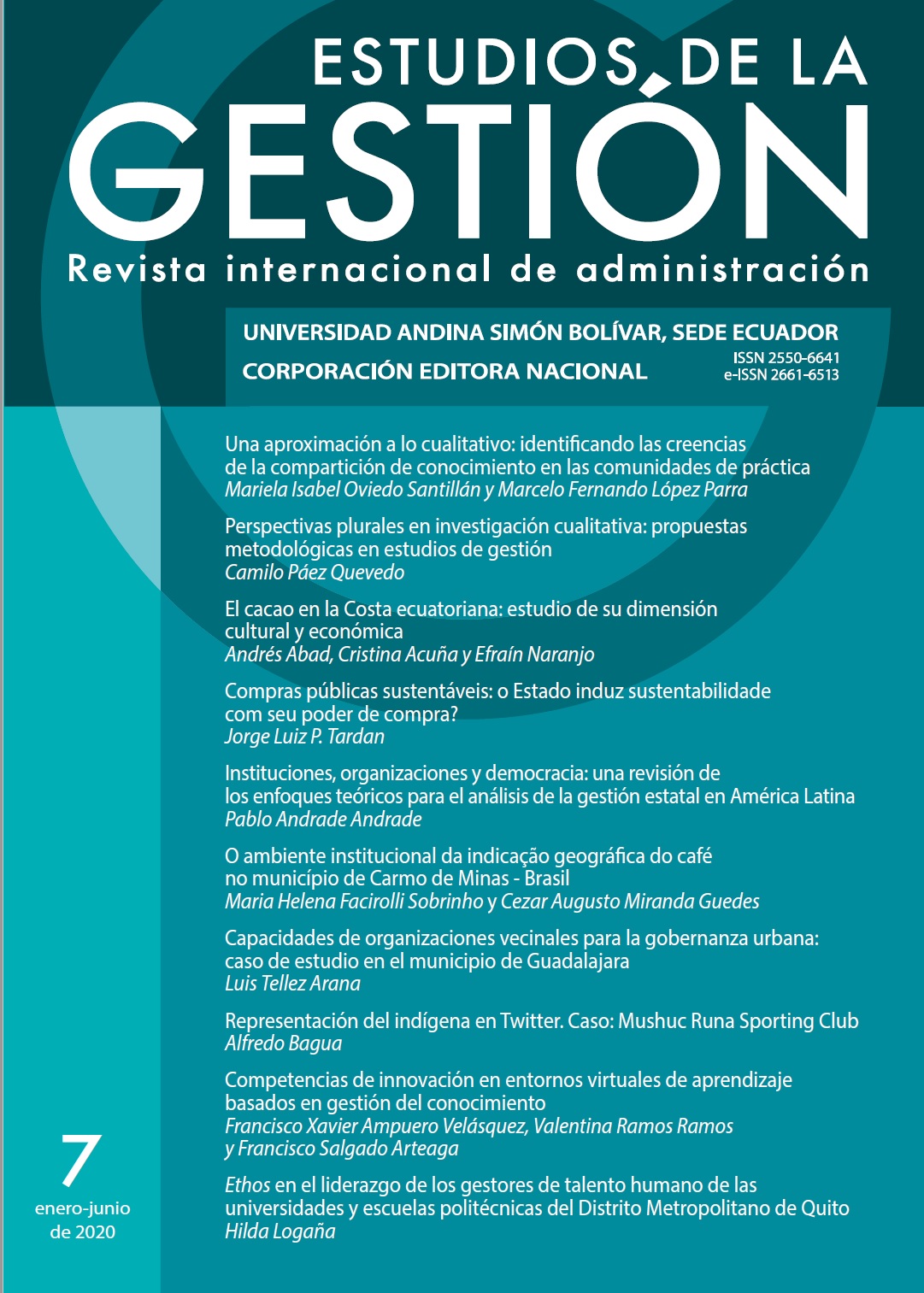Ethos in the leadership of the human talent managers of universities and polytechnic schools of the Metropolitan District of Quito
DOI:
https://doi.org/10.32719/25506641.2020.7.10Abstract
Ethos in leadership is the ontological foundation (existing-real-philosophical) of a profession and dictates, marks, guides the disposition of the Manager when exercising the functions that by his profession performs, as well as determines how to achieve professional fulfilment. Ethos cannot be treated individually but as a result of: a particular social structure, politics, economics and even culture; Ethos’ reference is dynamic because it is changeable over time, modifiable and turns out to be part of both personal and social trajectory. Among the personal factors that affect Ethos are: age, income, type of education, job stability, health aspects and social factors including public and private systems. This study shows from the bibliography a theoretical foundation of all the elements, concepts, the moral-professional being, the motivational structure, the context of ethics, leadership, and the formation of the Human Talent Manager. The analysis of the Ecuadorian and South American university is contextualized, within the framework of the reforms that have taken place in the universities and the competitiveness strategies among them.
Downloads
References
Aranguren, José Luis. 1958. Ética. Madrid: Revista de Occidente.
De Lella, Cayetano. 1999. “Modelos y tendencias de la formación docente”. Conferencia del I Seminario Taller sobre el Perfil del Docente y Estrategias de Formación, Lima. https://bit.ly/38TJ4TV
EC CEAACES. 2015. Informe general sobre la evaluación, acreditación y categorización de las Universidades y Escuelas Politécnicas. https://universidadsociedadec.files.wordpress.com/2014/04/ceaaces-informe-general-eval-accred-categn.pdf
EC. 2008. Constitución de la República del Ecuador. Registro Oficial 449, 20 de octubre.
Habermas, Jürgen. 1973. Problemas de legitimación en el capitalismo tardío. Madrid: Editorial Suhrkamp.
López Ruiz, Oswaldo. 2007. Ethos empresarial: el “capital humano” como valor social. Estudios Sociológicos. Ciudad de México: El Colegio de México.
Martínez, Horacio. 2010a. Liderazgo responsable. Bogotá: Ecoe Ediciones.
---. 2010b. Responsabilidad social y ética empresarial. Bogotá: Ecoe Ediciones.
Octavi, Fullat, y Clara Gomis. 1987. El hombre, un animal ético. Barcelona: Vicens-Vives.
Olaz, Angel. 2012. Manual de recursos humanos. Murcia: Servicio Universidad de Murcia.
Randall, Schuler, y Susan Jackson. 1987. “Linking Competitive Strategies with Human Resource Management Practices”. The Academy of Management Executive (42): 207-219. https://journals.aom.org/doi/abs/10.5465/ame.1987.4275740?journalCode=amp
Rodríguez Córdoba, María del Pilar, y Uriel Bustamante Lozano. 2008. “Desarrollo de competencias para el comportamiento ético-gerencial: un enfoque de responsabilidad”. Cuadernos de Administración 21 (35): 205-228. https://bit.ly/3e8VYzQ
Romero Villagómez, Citlali, y María Teresa Yurén Camarena. 2007. “Ethos profesional, dispositivo universitario y conformación”. Reencuentro (49), 22-29. http://www.redalyc.org/articulo.oa?id=34004904
Sancén Contreras, Fernando. 2013. “Ciencia y ethos: una ética para el futuro (a propósito de la Diskursethik de Jürgen Habermas)”. Signos Filosóficos 15 (29): 39-69. https://bit.ly/2LRdQTF
Sonnenfeld, Alfred. 2012. Liderazgo ético: la sabiduría de decidir bien. Madrid: Encuentro.
Yuren, Teresa. 2005. “Ethos y autoformación en los dispositivos de formación de docentes”. En Ethos y autoformación del docente. Análisis de dispositivos de formación de profesores, coordinado por Teresa Yurén, Cecilia Navia y Cony Saenger. Barcelona: Editorial
Pomares.












